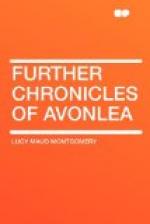It was now almost dark. The guests would not be coming for half an hour yet. It was only fifteen minutes’ walk over the hill to the Cove. Hastily Rachel shrouded herself in her new raincoat, and drew a dark, protecting hood over her gay head. She opened the door and slipped noiselessly downstairs. Mrs. Spencer and her assistants were all busy in the back part of the house. In a moment Rachel was out in the dewy garden. She would go straight over the fields. Nobody would see her.
It was quite dark when she reached the Cove. In the crystal cup of the sky over her the stars were blinking. Flying flakes of foam were scurrying over the sand like elfin things. A soft little wind was crooning about the eaves of the little gray house where David Spencer was sitting, alone in the twilight, his violin on his knee. He had been trying to play, but could not. His heart yearned after his daughter—yes, and after a long-estranged bride of his youth. His love of the sea was sated forever; his love for wife and child still cried for its own under all his old anger and stubbornness.
The door opened suddenly and the very Rachel of whom he was dreaming came suddenly in, flinging off her wraps and standing forth in her young beauty and bridal adornments, a splendid creature, almost lighting up the gloom with her radiance.
“Father,” she cried, brokenly, and her father’s eager arms closed around her.
Back in the house she had left, the guests were coming to the wedding. There were jests and laughter and friendly greeting. The bridegroom came, too, a slim, dark-eyed lad who tiptoed bashfully upstairs to the spare room, from which he presently emerged to confront Mrs. Spencer on the landing.
“I want to see Rachel before we go down,” he said, blushing.
Mrs. Spencer deposited a wedding present of linen on the table which was already laden with gifts, opening the door of Rachel’s room, and called her. There was no reply; the room was dark and still. In sudden alarm, Isabella Spencer snatched the lamp from the hall table and held it up. The little white room was empty. No blushing, white-clad bride tenanted it. But David Spencer’s letter was lying on the stand. She caught it up and read it.
“Rachel is gone,” she gasped. A flash of intuition had revealed to her where and why the girl had gone.
“Gone!” echoed Frank, his face blanching. His pallid dismay recalled Mrs. Spencer to herself. She gave a bitter, ugly little laugh.
“Oh, you needn’t look so scared, Frank. She hasn’t run away from you. Hush; come in here—shut the door. Nobody must know of this. Nice gossip it would make! That little fool has gone to the Cove to see her—her father. I know she has. It’s just like what she would do. He sent her those presents—look—and this letter. Read it. She has gone to coax him to come and see her married. She was crazy about it. And the minister is here and it is half-past seven. She’ll ruin her dress and shoes in the dust and dew. And what if some one has seen her! Was there ever such a little fool?”




